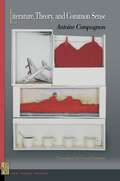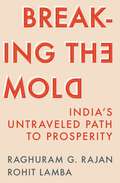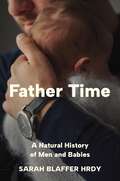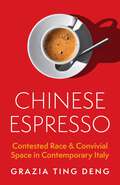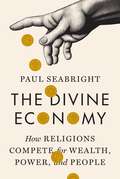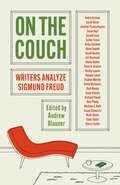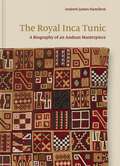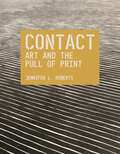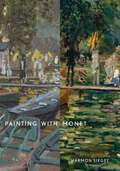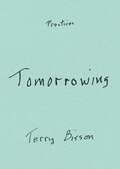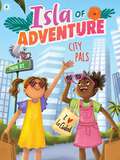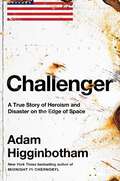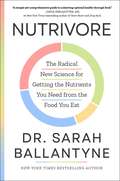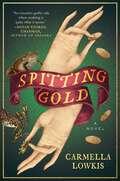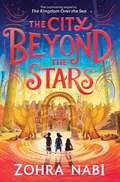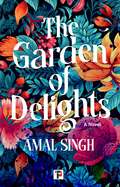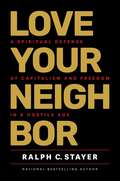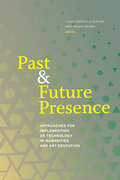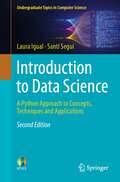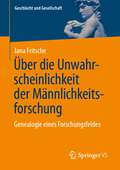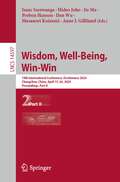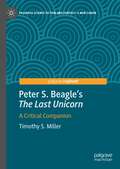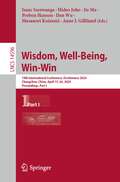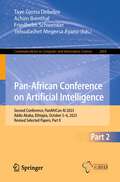- Table View
- List View
Literature, Theory, and Common Sense (New French Thought Series #5)
by Antoine CompagnonAn engaging introduction to contemporary debates in literary theoryIn the late twentieth century, the common sense approach to literature was deemed naïve. Roland Barthes proclaimed the death of the author, and Hillis Miller declared that all interpretation is theoretical. In many a literature department, graduate students spent far more time on Derrida and Foucault than on Shakespeare and Milton. Despite this, common sense approaches to literature—including the belief that literature represents reality and authorial intentions matter—have resisted theory with tenacity. As a result, argues Antoine Compagnon, theorists have gone to extremes, boxed themselves into paradoxes, and distanced others from their ideas. Eloquently assessing the accomplishments and failings of literary theory, Compagnon ultimately defends the methods and goals of a theoretical commitment tempered by the wisdom of common sense.The book is organized not by school of thought but around seven central questions: literariness, the author, the world, the reader, style, history, and value. What makes a work literature? Does fiction imitate reality? Is the reader present in the text? What constitutes style? Is the context in which a work is written important to its apprehension? Are literary values universal?As he examines how theory has wrestled these themes, Compagnon establishes not a simple middle-ground but a state of productive tension between high theory and common sense. The result is a book that will be met with both controversy and sighs of relief.
Breaking the Mold: India’s Untraveled Path to Prosperity
by Raghuram G. Rajan Rohit LambaThe new path for economic development that India must create The whole world has a stake in India&’s future, and that future hinges on whether India can develop its economy and deliver for its population—now the world&’s largest—while staying democratic. India&’s economy has overtaken the United Kingdom&’s to become the fifth-largest in the world, but it is still only one-fifth the size of China&’s, and India&’s economic growth is too slow to provide jobs for millions of its ambitious youth. Blocking India&’s current path are intense global competition in low-skilled manufacturing, increasing protectionism and automation, and the country&’s majoritarian streak in politics. In Breaking the Mold, Raghuram Rajan and Rohit Lamba show why and how India needs to blaze a new path if it&’s to succeed.India diverged long ago from the standard development model, the one followed by China—from agriculture to low-skilled manufacturing, then high-skilled manufacturing and, finally, services—by leapfrogging intermediate steps. India must not turn back now. Rajan and Lamba explain how India can accelerate growth by prioritizing human capital, expanding opportunities in high-skilled services, encouraging entrepreneurship, and strengthening rather than weakening its democratic traditions. It can chart a path based on ideas and creativity even at its early stage of development.Filled with vivid examples and written with incisive candor, Breaking the Mold shows how India can break free of the stumbling blocks of the past and embrace the enormous possibilities of the future.
Father Time: A Natural History of Men and Babies
by Sarah Blaffer HrdyA sweeping account of male nurturing, explaining how and why men are biologically transformed when they care for babies It has long seemed self-evident that women care for babies and men do other things. Hasn&’t it always been so? When evolutionary science came along, it rubber-stamped this venerable division of labor: mammalian males evolved to compete for status and mates, while females were purpose-built to gestate, suckle, and otherwise nurture the victors&’ offspring. But come the twenty-first century, increasing numbers of men are tending babies, sometimes right from birth. How can this be happening? Puzzled and dazzled by the tender expertise of new fathers around the world—several in her own family—celebrated evolutionary anthropologist and primatologist Sarah Blaffer Hrdy set out to trace the deep history of male nurturing and explain a surprising departure from everything she had assumed to be &“normal.&”In Father Time, Hrdy draws on a wealth of research to argue that this ongoing transformation in men is not only cultural, but profoundly biological. Men in prolonged intimate contact with babies exhibit responses nearly identical to those in the bodies and brains of mothers. They develop caring potential few realized men possessed. In her quest to explain how men came to nurture babies, Hrdy travels back through millions of years of human, primate, and mammalian evolution, then back further still to the earliest vertebrates—all while taking into account recent economic and social trends and technological innovations and incorporating new findings from neuroscience, genetics, endocrinology, and more. The result is a masterful synthesis of evolutionary and historical perspectives that expands our understanding of what it means to be a man—and what the implications might be for society and our species.
Chinese Espresso: Contested Race and Convivial Space in Contemporary Italy
by Grazia Ting DengWhy and how local coffee bars in Italy—those distinctively Italian social and cultural spaces—have been increasingly managed by Chinese baristas since the Great Recession of 2008Italians regard espresso as a quintessentially Italian cultural product—so much so that Italy has applied to add Italian espresso to UNESCO&’s official list of intangible heritages of humanity. The coffee bar is a cornerstone of Italian urban life, with city residents sipping espresso at more than 100,000 of these local businesses throughout the country. And yet, despite its nationalist bona fides, espresso in Italy is increasingly prepared by Chinese baristas in Chinese-managed coffee bars. In this book, Grazia Ting Deng explores the paradox of &“Chinese espresso&”—the fact that this most distinctive Italian social and cultural tradition is being preserved by Chinese immigrants and their racially diverse clientele.Deng investigates the conditions, mechanisms, and implications of the rapid spread of Chinese-owned coffee bars in Italy since the Great Recession of 2008. Drawing on her extensive ethnographic research in Bologna, Deng describes an immigrant group that relies on reciprocal and flexible family labor to make coffee, deploying local knowledge gleaned from longtime residents who have come, sometimes resentfully, to regard this arrangement as a new normal. The existence of Chinese espresso represents new features of postmodern and postcolonial urban life in a pluralistic society where immigrants assume traditional roles even as they are regarded as racial others. The story of Chinese baristas and their patrons, Deng argues, transcends the dominant Eurocentric narrative of immigrant-host relations, complicating our understanding of cultural dynamics and racial formation within the shifting demographic realities of the Global North.
The Divine Economy: How Religions Compete for Wealth, Power, and People
by Paul SeabrightA novel economic interpretation of how religions have become so powerful in the modern worldReligion in the twenty-first century is alive and well across the world, despite its apparent decline in North America and parts of Europe. Vigorous competition between and within religious movements has led to their accumulating great power and wealth. Religions in many traditions have honed their competitive strategies over thousands of years. Today, they are big business; like businesses, they must recruit, raise funds, disburse budgets, manage facilities, organize transportation, motivate employees, and get their message out. In The Divine Economy, economist Paul Seabright argues that religious movements are a special kind of business: they are platforms, bringing together communities of members who seek many different things from one another—spiritual fulfilment, friendship and marriage networks, even business opportunities. Their function as platforms, he contends, is what has allowed religions to consolidate and wield power.This power can be used for good, especially when religious movements provide their members with insurance against the shocks of modern life, and a sense of worth in their communities. It can also be used for harm: political leaders often instrumentalize religious movements for authoritarian ends, and religious leaders can exploit the trust of members to inflict sexual, emotional, financial or physical abuse, or to provoke violence against outsiders. Writing in a nonpartisan spirit, Seabright uses insights from economics to show how religion and secular society can work together in a world where some people feel no need for religion, but many continue to respond with enthusiasm to its call.
On the Couch: Writers Analyze Sigmund Freud
by Andrew BlaunerA collection of colorful and candid essays and other pieces about Freud and his legacy today, featuring twenty-five leading writersWith original contributions by André Aciman • Sarah Boxer • Jennifer Finney Boylan • Susie Boyt • Gerald Early • Esther Freud • Rivka Galchen • Adam Gopnik • David Gordon • Siri Hustvedt • Sheila Kohler • Peter D. Kramer • Phillip Lopate • Thomas Lynch • Daphne Merkin • David Michaelis • Rick Moody • Susie Orbach • Richard Panek • Alex Pheby • Michael S. Roth • Casey Schwartz • Mark Solms • Colm Tóibín • Sherry TurkleW. H. Auden described Sigmund Freud (1856–1939) as &“a whole climate of opinion / Under whom we conduct our differing lives.&” The controversial father of psychiatry and psychoanalysis, Freud charted the human unconscious, brought us the talking cure, and wrote books that now rank among the classics of world literature. In On the Couch, the great analyst is analyzed by some of today&’s great writers and thinkers, who help us understand the man who has helped us understand ourselves as much, if not more, than anyone else, ever. The result is a fresh, multifaceted reassessment of Freud&’s continuing relevance and influence on ideas, literature, culture, science, and more.Here, Colm Tóibín writes about Freud, World War I, Henry James, and Thomas Mann; Adam Gopnik explores Freud&’s Civilization and Its Discontents; Susie Orbach considers Freud&’s &“ordinary unhappiness&” and D. W. Winnicott&’s &“good enough&”; Jennifer Finney Boylan reflects on penis envy and gender identity; Peter Kramer describes how new science and drugs have revolutionized psychology since Freud; Susie Boyt, one of Freud&’s great-granddaughters, spends the night at the Freud Museum in London; Siri Hustvedt examines Freud&’s divided reception today; and there&’s much more.Filled with insights, provocation, and humor, On the Couch offers an original and nuanced portrait of Freud as a complex figure who, for all his flaws, forever changed how we see ourselves and the world.
The Royal Inca Tunic: A Biography of an Andean Masterpiece
by Andrew James HamiltonThe hidden life of the greatest surviving work of Inca artThe most celebrated Andean artwork in the world is a five-hundred-year-old Inca tunic made famous through theories about the meanings of its intricate designs, including attempts to read them as a long-lost writing system. But very little is really known about it. The Royal Inca Tunic reconstructs the history of this enigmatic object, presenting significant new findings about its manufacture and symbolism in Inca visual culture.Andrew James Hamilton draws on meticulous physical examinations of the garment conducted over a decade, wide-ranging studies of colonial Peruvian manuscripts, and groundbreaking research into the tunic&’s provenance. He methodically builds a case for the textile having been woven by two women who belonged to the very highest echelon of Inca artists for the last emperor of the Inca Empire on the eve of the Spanish invasion in 1532. Hamilton reveals for the first time that this imperial vestment remains unfinished and has suffered massive dye fading that transforms its appearance today, and he proposes a bold new conception of what this radiant masterpiece originally looked like.Featuring stunning photography of the tunic and Hamilton&’s own beautiful illustrations, The Royal Inca Tunic demonstrates why this object holds an important place in the canon of art history as a deft creation by Indigenous women artists, a reminder of the horrors of colonialism, and an emblem of contemporary Andean identity.
Contact: Art and the Pull of Print (The A. W. Mellon Lectures in the Fine Arts #70)
by Jennifer L. RobertsA leading art historian presents a new grammar for understanding the meaning and significance of printIn process and technique, printmaking is an art of physical contact. From woodcut and engraving to lithography and screenprinting, every print is the record of a contact event: the transfer of an image between surfaces, under pressure, followed by release. Contact reveals how the physical properties of print have their own poetics and politics and provides a new framework for understanding the intelligence and continuing relevance of printmaking today.The seemingly simple physics of printmaking brings with it an array of metamorphoses that give expression to many of the social and conceptual concerns at the heart of modern and contemporary art. Exploring transformations such as reversal, separation, and interference, Jennifer Roberts explores these dynamics in the work of Christiane Baumgartner, David Hammons, Edgar Heap of Birds, Jasper Johns, Corita Kent, Glenn Ligon, Julie Mehretu, Robert Rauschenberg, and many other leading artists who work at the edge of the medium and beyond.Focusing on the material and spatial transformations of the printmaking process rather than its reproducibility, this beautifully illustrated book explores the connections between print, painting, and sculpture, but also between the fine arts, industrial arts, decorative arts, and domestic arts. Throughout, Roberts asks what artists are learning from print, and what we, in turn, can learn from them.Published in association with the Center for Advanced Study in the Visual Arts, National Gallery of Art, Washington
Painting with Monet
by Harmon SiegelA major reassessment of the methods and meaning of impressionismAt pivotal moments in his career, Claude Monet would go out with a fellow artist, plant his easel beside his friend&’s, and paint the same scene. Painting with Monet closely examines pairs of such works, showing how attention to this practice raises tantalizing new questions about Monet&’s art and about impressionism as a movement.Is impressionist painting an objective attempt to capture reality as it really is? Or is it a subjective expression of the artist&’s unique way of perceiving things? How can artists create a movement without conformity extinguishing individuality? Harmon Siegel reveals how Monet explored problems like these in concrete, practical ways while painting alongside his teachers, Eugène Boudin and Johan Barthold Jongkind; his friends, Frédéric Bazille and Pierre-Auguste Renoir; and his hero, Édouard Manet. At a time of major cultural upheavals, these artists asked how we can know reality beyond our personal perception. Siegel provides new insights into the aesthetic, philosophical, and ethical stakes for these painters as they responded to a rapidly changing society.Beautifully illustrated, Painting with Monet sheds critical light on how Monet and his fellow impressionists, painting side by side, professed their capacity to know the world and affirmed their belief in what Siegel calls the reality of others.
Tomorrowing (Practices)
by Terry BissonFor twenty years, Terry Bisson published a regular “This Month in History” column in the science fiction magazine Locus. Tomorrowing collects these two decades of memorable events---four per month---each set in a totally different imaginary yet possible, inevitable yet avoidable future. From the first AI president to the first dog on Mars to the funeral of Earth’s last glacier, these stories are speculative SF at its most (and least) serious. Collected as a series for the first time, Tomorrowing will amuse, alarm, intrigue, entertain, and like all good science fiction, make readers think. Bisson’s short stories have won every major award in science fiction, including the Hugo and the Nebula, but never, ever anything for this series.
City Pals (Isla of Adventure #8)
by Dela CostaIn the eighth Isla of Adventure chapter book, island girl Isla Verde heads into her first-ever big-city adventure!Isla is traveling by airplane for the first time ever as she heads into La Ciudad, the big city! With her friend Tora by her side, Isla is sure she&’ll have a blast. But a pesky pigeon threatens to ruin their summertime fun! With easy-to-read language and illustrations on almost every page, the Isla of Adventure chapter books are perfect for beginning readers.
Challenger: A True Story of Heroism and Disaster on the Edge of Space
by Adam Higginbotham&“Vivid…A true-life thriller.&” —The New York Times • &“Gripping history.&” —Publishers Weekly (starred review) • &“Dramatic…[A] moving narrative.&” —The Wall Street Journal • &“One of this generation&’s best nonfiction writers working at the top of his game.&” —Garrett M. Graff From the New York Times bestselling author of Midnight in Chernobyl comes the definitive, dramatic, minute-by-minute story of the Challenger disaster, based on fascinating in-depth reporting and new archival research—a riveting history that reads like a thriller.On January 28, 1986, just seventy-three seconds into flight, the space shuttle Challenger broke apart over the Atlantic Ocean, killing all seven people on board. Millions of Americans witnessed the tragic deaths of the crew, which included New Hampshire schoolteacher Christa McAuliffe. Like the assassination of JFK, the Challenger disaster is a defining moment in twentieth-century history—one that forever changed the way America thought of itself and its optimistic view of the future. Yet the full story of what happened, and why, has never been told. Based on extensive archival research and meticulous, original reporting, Challenger: A True Story of Heroism and Disaster on the Edge of Space follows a handful of central protagonists—including each of the seven members of the doomed crew—through the years leading up to the accident, and offers a detailed account of the tragedy itself and the investigation afterward. It&’s a compelling tale of ambition and ingenuity undermined by political cynicism and cost-cutting in the interests of burnishing national prestige; of hubris and heroism; and of an investigation driven by leakers and whistleblowers determined to bring the truth to light. Throughout, there are the ominous warning signs of a tragedy to come, recognized but then ignored, and later hidden from the public. Higginbotham reveals the history of the shuttle program and the lives of men and women whose stories have been overshadowed by the disaster, as well as the designers, engineers, and test pilots who struggled against the odds to get the first shuttle into space. A masterful blend of riveting human drama and fascinating and absorbing science, Challenger identifies a turning point in history—and brings to life an even more complex and astonishing story than we remember.
Nutrivore: The Radical New Science for Getting the Nutrients You Need from the Food You Eat
by Dr Sarah BallantyneDitch diet culture and get the most nutrients from your food with the no-guilt, personalized, and exciting new science that will change how you think about food and nourishment, from New York Times bestselling author Dr. Sarah Ballantyne.Almost all of us are missing essential vitamins and minerals from our diets that leave us feeling unwell and unable to achieve our health goals—even those of us who take our daily multi, buy organic produce, or have tried to kick-start our health with different dietary habits. Now, bestselling author Dr. Sarah Ballantyne throws all of that out the window in favor of a simple yet radical idea: choose foods to meet our nutritional needs. Unlock health and vitality with Nutrivore, a transformative guide that navigates the world of nutrition, dispels diet myths, and empowers you to embrace a nutrient-focused lifestyle tailored to your unique needs. Nutrivore is a paradigm shifting, comprehensive approach to nutrition that includes: -An easy-to-follow plan for getting the full spectrum of nutrients we all need to reach our health goals, focusing on twelve foundational food families. -Definitive science that identifies foods rich in the nutrients that treat common symptoms and ailments. -Comprehensive lists of foods and pain points that you can use to craft your own unique eating plan, such as eating magnesium-rich leafy greens to help with headaches, potassium-packed sweet potatoes to help lower blood pressure, or molasses loaded with calcium to relieve PMS. With no food off-limits, Nutrivore is a permissive dietary structure, emphasizing nutrient-rich selections compatible with your preferred diet or anti-diet, that can reduce your risk of future health problems and help alleviate the symptoms you&’re currently facing—so you can finally start feeling good every day.
Spitting Gold: A Novel
by Carmella LowkisA deliciously haunting debut for fans of Sarah Waters and Sarah Penner set in 19th-century Paris, blending gothic mystery with a captivating sapphic romance as two estranged sisters—celebrated (and fraudulent) spirit mediums—come back together for one last con.Paris, 1866. When Baroness Sylvie Devereux receives a house call from Charlotte Mothe, the sister she disowned, she fears her shady past as a spirit medium has caught up with her. But with their father ill and Charlotte unable to pay his bills, Sylvie is persuaded into one last con. Their marks are the de Jacquinots: dysfunctional aristocrats who believe they are haunted by their great aunt, brutally murdered during the French Revolution. The scheme underway, the sisters deploy every trick to terrify the family out of their gold. But when inexplicable horrors start to happen to them too, the duo question whether they really are at the mercy of a vengeful spirit. And what other deep, dark secrets may come to light?
The City Beyond the Stars (The Kingdom Over the Sea)
by Zohra NabiThe captivating sequel to &“perfect for fans of Philip Pullman and Tahereh Mafi&” (Booklist) The Kingdom Over the Sea follows Yara and her friends as they change the fate of the kingdom and their magic forever.Yara may have stopped the magical plague spreading its way through her new home, but to do so, she had to leave her mother in the hands of the sinister alchemists. Now Yara longs to return to Zehaira and free her mother from her prison. Yet when her mother&’s familiar arrives, close to death and bearing a message, Yara must put aside her plans to rescue her and instead set off with her friends to the official residence of the Grand High Sorceress, convinced it holds magic powerful enough to defeat the alchemists. After a treacherous journey, Yara finds her mother&’s house, and in it, a girl claiming to be the daughter of the Grand High Sorceress—a sister Yara didn&’t know she had. Meanwhile, the alchemists are circling ever closer, and the magic that Yara&’s mother was working threatens the foundations of their world. Yara is unsure if her newfound sister can be trusted, but she is going to need all the help she can get if she wants to save their mother and take back Zehaira from the alchemists&’ rule.
The Garden of Delights
by Amal Singh"Lyrical, philosophical, empathetic... perfect for fans of Usman Malik and Gautam Bhatia."In the city of Sirvassa, where petals are currency and flowers are magic, the Caretaker tends to the Garden of Delights. He imparts temporary magical abilities to the citizens of Sirvassa, while battling a curse of eternal old age. No Delight could uplift his curse, and so he must seek out a mythical figure. A god.When a Delight allows a young girl an ability to change reality, the Caretaker believes he&’s at the end of his search. But soon a magical rot takes root in his Garden, and the Caretaker must join forces with the girl and stop it from spreading. Even as he battles a different rot that plagues Sirvassa, he learns that Delights are always a precursor to Sorrows.FLAME TREE PRESS is the imprint of long-standing Independent Flame Tree Publishing, dedicated to full-length original fiction in the horror and suspense, science fiction & fantasy, and crime / mystery / thriller categories. The list brings together fantastic new authors and the more established; the award winners, and exciting, original voices. Learn more about Flame Tree Press at www.flametreepress.com and connect on social media @FlameTreePress.
Adult CCRN Exam Flashcards, Third Edition: Up-to-Date Review and Practice (Barron's Test Prep)
by Pat Juarez RN, MSBe prepared for exam day with Barron&’s. Trusted content from an Adult CCRN Exam expert!Barron&’s Adult CCRN Exam Flashcards includes 425 up-to-date content review and practice questions.Written by an Experienced Educator and NurseLearn from Barron&’s--all content is written and reviewed by an expert CCRN review course instructor and former clinical nurse specialist Build your understanding with review and practice tailored to the most recent Adult CCRN exam (also known as the Direct Care Pathway)Get a leg up with tips, strategies, and study advice for exam day--it&’s like having a trusted tutor by your sideBe Confident on Exam DaySharpen your test-taking skills with practice questions for all sections of the exam blueprint that reflect actual exam questions in format, content, and degree of difficultyDeepen your understanding by reviewing the detailed answer explanations that accompany all questionsStrengthen your knowledge with a review of all essential topics, including cardiovascular concepts, respiratory concepts, multisystem concepts, and much more, in an easy-to-follow outline format
Love Your Neighbor: A Spiritual Defense of Capitalism and Freedom in a Hostile Age
by Ralph C. StayerLove Your Neighbor makes the case for capitalism as the only system that can end poverty, solve intractable crises, and increase human flourishing.Love Your Neighbor builds on the National Best Seller Flight of the Buffalo by Ralph Stayer with James Belasco. Ralph's story and experience transformed the business world. It offers a bold and straightforward plan for rethinking leadership—still taught in business schools and leadership seminars worldwide. Finally, after decades of more experience, Love Your Neighbor delivers the sequel that readers demanded. Love Your Neighbor is the fruit of that patience—and thirty years of reflection and leadership. As the longtime CEO of Johnsonville Foods, Ralph learned to let his workers lead. Love Your Neighbor shows that the real secret behind Johnsonville's success was a conscious decision to align the company's practices with God's plan for human flourishing. Love Your Neighbor defends and champions capitalism which continues to be under attack in America—and why faith-informed capitalism is the only vehicle that can bring prosperity and purpose to everyone. Love Your Neighbor goes beyond that of another pretty sermon—it's a blueprint for transformation based on Ralph's decades of experience as one of America's most successful CEOs. It provides a moral foundation for capitalism during a time of challenge and crisis, demonstrating its vast superiority over socialism and other fallen economic systems. Ralph's experience at Johnsonville Foods points to a proud and unapologetic conviction in capitalism that serves God, builds strong communities, and embodies what it means to love your neighbor.
Past and Future Presence: Approaches for Implementing XR Technology in Humanities and Art Education
by Lissa Crofton-Sleigh Brian BeamsWhile uses and studies of XR technology within STEM-based education have been plentiful in recent years, there has been lesser or even, at times, a lack of coverage for this novel learning tool in the arts and humanities.Past and Future Presence aims to bridge some of that gap by presenting research-based theory and case studies of successful application and implementation of XR technology into postsecondary educational settings, ranging in topics from ancient to modern languages, classical and contemporary art, and reenvisioned historical scenes and events presented in ways never seen before. The studies also contemplate how this novel medium can enhance and supplement learning in classrooms and other formal or informal learning environments. The volume as a whole is intended to demonstrate to educators, scholars, and researchers in higher education the potential value of integrating XR technology into their classrooms and to provide a strong argument for college and university administrators to invest in training and development of new research and content for classrooms inside and outside of STEM. The authors of these chapters come from a diverse range of backgrounds at different stages of their careers, providing a broad crosssection of scholastic work within the humanities and arts. Each chapter offers a different angle or approach to incorporating XR technology into teaching or research within different subject areas. As the volume suggests, this technology also places additional emphasis on the humanity within the humanities, by focusing on increasing connection between users and different cultures, time periods, and perspectives.
Introduction to Data Science: A Python Approach to Concepts, Techniques and Applications (Undergraduate Topics in Computer Science)
by Laura Igual Santi SeguíThis accessible and classroom-tested textbook/reference presents an introduction to the fundamentals of the interdisciplinary field of data science. The coverage spans key concepts from statistics, machine/deep learning and responsible data science, useful techniques for network analysis and natural language processing, and practical applications of data science such as recommender systems or sentiment analysis. Topics and features: Provides numerous practical case studies using real-world data throughout the book Supports understanding through hands-on experience of solving data science problems using Python Describes concepts, techniques and tools for statistical analysis, machine learning, graph analysis, natural language processing, deep learning and responsible data scienceReviews a range of applications of data science, including recommender systems and sentiment analysis of text data Provides supplementary code resources and data at an associated website This practically-focused textbook provides an ideal introduction to the field for upper-tier undergraduate and beginning graduate students from computer science, mathematics, statistics, and other technical disciplines. The work is also eminently suitable for professionals on continuous education short courses, and to researchers following self-study courses.
Über die Unwahrscheinlichkeit der Männlichkeitsforschung: Genealogie eines Forschungsfeldes (Geschlecht und Gesellschaft #80)
by Jana Fritsche‚Männlichkeit‘ gilt als lange gleichgesetzt mit dem ‚Allgemein-Menschlichen‘ und daher als Spezifikum regelrecht unsichtbar. Was macht das Nachdenken über und die Beforschung von ‚Männlichkeit‘ dann epistemologisch wie gesellschaftlich wahrscheinlich? Dieser Frage geht die vorliegende Studie aus gesellschaftstheoretischer Perspektive nach. Entlang sozialwissenschaftlicher Publikationen zu ‚Männlichkeit‘ von 1908-2022 werden gesellschaftliche Zusammenhänge rekonstruiert, die die (wissenschaftliche) Reflexivierung von ‚Männlichkeit‘ bedingen. Damit stellt die Studie eine erste systematische Untersuchung des Feldes der Männlichkeitsforschung dar. Zudem entpuppt sich das vergleichsweise kleine Forschungsfeld als reichhaltiges Labor, an dem sich über dessen Partikularität hinaus soziologische Grundfragen und methodologische Aspekte diskutieren lassen: darunter Subjekt-Gesellschaft-Verhältnisse, Epistemologie und Operationalisierung, Prozesse der Grenzziehungen und Stabilisierung wissenschaftlicher Disziplinen sowie die Bedeutung von Un-/Sichtbarkeit, Paradoxien und blinden Flecken von Beobachtungen.
Wisdom, Well-Being, Win-Win: 19th International Conference, iConference 2024, Changchun, China, April 15–26, 2024, Proceedings, Part II (Lecture Notes in Computer Science #14597)
by Isaac Sserwanga Hideo Joho Jie Ma Preben Hansen Dan Wu Masanori Koizumi Anne J. GillilandThe Three-volume set LNCS 14596, 14596 and 14598 constitutes the proceedings of the 19th International Conference on Wisdom, Well-Being, Win-Win, iConference 2024, which was hosted virtually by University of Tsukuba, Japan and in presence by Jilin University, Changchun, China, during April 15–26, 2024. The 36 full papers and 55 short papers are presented in these proceedings were carefully reviewed and selected from 218 submissions. The papers are organized in the following topical sections: Volume I: Archives and Information Sustainability; Behavioural Research; AI and Machine Learning; Information Science and Data Science; Information and Digital Literacy. Volume II: Digital Humanities; Intellectual Property Issues; Social Media and Digital Networks; Disinformation and Misinformation; Libraries, Bibliometrics and Metadata. Volume III: Knowledge Management; Information Science Education; Information Governance and Ethics; Health Informatics; Human-AI Collaboration; Information Retrieval; Community Informatics; Scholarly, Communication and Open Access.
Peter S. Beagle's “The Last Unicorn”: A Critical Companion (Palgrave Science Fiction and Fantasy: A New Canon)
by Timothy S. MillerThis book assesses the work of one of the foundational figures of American fantasy, Peter S. Beagle. Through its focused analysis of The Last Unicorn, this study contextualises Beagle’s work in relation to the popularity of the fantasy genre, following its growing success in the aftermath of Tolkien’s The Lord of the Rings. In addition, through reference to the film adaptation of The Last Unicorn and also Beagle’s other works, this study highlights the author’s longevity and the influence that his metafictional and comedic work has had on contemporary fantasy.
Wisdom, Well-Being, Win-Win: 19th International Conference, iConference 2024, Changchun, China, April 15–26, 2024, Proceedings, Part I (Lecture Notes in Computer Science #14596)
by Isaac Sserwanga Hideo Joho Jie Ma Preben Hansen Dan Wu Masanori Koizumi Anne J. GillilandThe Three-volume set LNCS 14596, 14596 and 14598 constitutes the proceedings of the 19th International Conference on Wisdom, Well-Being, Win-Win, iConference 2024, which was hosted virtually by University of Tsukuba, Japan and in presence by Jilin University, Changchun, China, during April 15–26, 2024. The 36 full papers and 55 short papers are presented in these proceedings were carefully reviewed and selected from 218 submissions. The papers are organized in the following topical sections: Volume I: Archives and Information Sustainability; Behavioural Research; AI and Machine Learning; Information Science and Data Science; Information and Digital Literacy. Volume II: Digital Humanities; Intellectual Property Issues; Social Media and Digital Networks; Disinformation and Misinformation; Libraries, Bibliometrics and Metadata. Volume III: Knowledge Management; Information Science Education; Information Governance and Ethics; Health Informatics; Human-AI Collaboration; Information Retrieval; Community Informatics; Scholarly, Communication and Open Access.
Pan-African Conference on Artificial Intelligence: Second Conference, PanAfriCon AI 2023, Addis Ababa, Ethiopia, October 5–6, 2023, Revised Selected Papers, Part II (Communications in Computer and Information Science #2069)
by Taye Girma Debelee Achim Ibenthal Friedhelm Schwenker Yehualashet Megersa AyanoThis two-volume set, CCIS 2068 and 2069, constitutes selected papers presented during the Second Pan-African Conference on Artificial Intelligence, PanAfriCon AI 2023, held in Addis Ababa, Ethiopia, in October 2023. The set goal of the conference is to exchange the best practices of joint Pan-African efforts to provide solutions for Africa’s key 21st century challenges in the social, economic and ecologic domains. The 29 papers were thoroughly reviewed and selected from 134 submissions. The papers are organized in the following topical sections: Medical AI; Natural Language Processing, Text and Speech Processing; AI in Finance and Cyber Security; Autonomous Vehicles; AI Ethics and Life Sciences.
